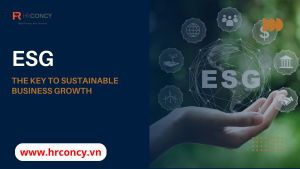What is ESG? The Core Focus of ESG in Business
In today’s business landscape, the concept of ESG (Environmental, Social, Governance) is becoming increasingly important and is being integrated into sustainable development strategies by many companies. So, what exactly is ESG? And why is ESG considered a core element in a company’s long-term growth journey?
1. What is ESG?
ESG stands for three fundamental factors:
-
Environmental: Refers to how a company manages its impact on the natural environment, including reducing carbon emissions, using resources efficiently, waste management, energy saving, and biodiversity protection.
-
Social: Involves a company’s responsibility towards people and communities, such as ensuring employee rights, workplace safety, gender equality, diversity and inclusion, social contributions, and supporting local communities.
-
Governance: Focuses on how a company governs itself, ensuring transparency, ethical business practices, anti-corruption measures, protecting shareholder rights, and complying with legal regulations.
2. Why is ESG increasingly important for businesses?
In the past, environmental and social factors were often seen as part of a company’s Corporate Social Responsibility (CSR) efforts. However, with the rise of climate change, environmental crises, and the growing demand for transparent governance, ESG has become a strategic priority that directly impacts business value.
-
Investors: Major global investment funds (such as BlackRock) prioritize companies with strong ESG ratings, viewing them as lower-risk and more sustainable growth opportunities.
-
Consumers: Modern consumers prefer products and services from environmentally friendly and socially responsible companies.
-
Labor Market: Younger generations (Gen Z, Millennials) are more inclined to work for companies that care about sustainable, ethical, and human-centered values.
-
Regulations & Media: Regulations on environmental, social, and governance practices are becoming stricter. Companies with transparent ESG practices are less likely to face media crises and legal risks.
3. The Core Focus of ESG in Business
To effectively implement ESG, businesses need to focus on the following key areas:
a. Align ESG with Business Strategy
ESG initiatives should not be isolated or superficial activities. Companies need to integrate ESG goals into their long-term strategies, from operational management to product development and human resource policies.
b. Risk Management and Transparency
The “Governance” aspect requires companies to build transparent governance structures, clear operational procedures, and robust internal controls. This foundation helps establish trust with investors and partners.
c. Developing a Sustainable Workforce
The “Social” aspect is realized through human resource policies that create a safe working environment, comprehensive welfare programs, promote diversity and inclusion, and foster long-term employee development.

d. Environmental Protection & Green Innovation
Companies should proactively minimize their environmental footprint through technological solutions, resource-saving initiatives, and digital transformation to optimize operations and reduce emissions.
ESG is not just a temporary trend but a “ticket” to sustainable business growth in the future. A well-executed ESG strategy enhances corporate reputation, strengthens competitive advantage, and contributes to building a better society. Companies that proactively embrace and invest in ESG today will be the leaders of tomorrow.
295 view







